Pentecost Sunday. Our world certainly looks differently than last week, doesn't it?
Not only have 100,000+ lives been lost to Covid-19 but yet again another unarmed black man in Minnesota has died because a police officer had his knee on his neck.
If your social media feed is anything like mine, it's full of rage, anger, tears, disappointment and laments of "How long O, Lord?" THIS MUST STOP.
Then, this weekend, the streets in Chicago, Dallas, my home base in Washington, DC and beyond have filled with protesters. In Atlanta on Friday night, i watched protesters ignite a police car in flames.
And I could think of no better word on a week like this to offer than fire.
Cities and their citizens all across America are erupting in fire right now. What can we learn?
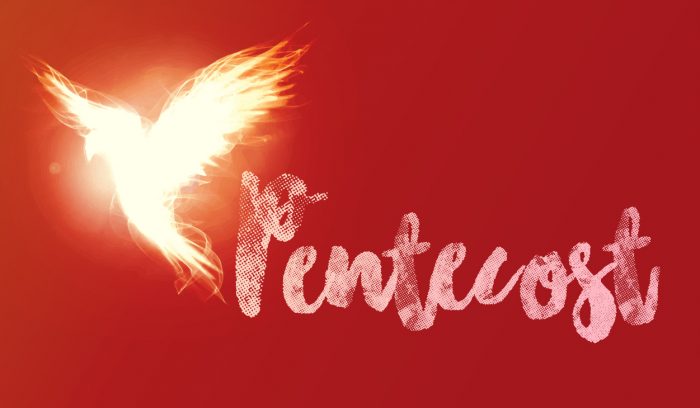 This Sunday, the text I'm preaching on at my church is all about fire. We're celebrating the birth of the church and the gift of the Spirit on the day of Pentecost-- the day when a fresh wind blew from heaven like fire.
This Sunday, the text I'm preaching on at my church is all about fire. We're celebrating the birth of the church and the gift of the Spirit on the day of Pentecost-- the day when a fresh wind blew from heaven like fire.
For when there is a fire: we all stop and take notice. You can't unsee it. You can't pretend it never happened. You smell it. You taste it. You hear it burn.
Fire electrifies. Fire projects. Fire eventually refines.
Ashes tell you that you must rebuild from a fire -- from the ground up.
A new foundation must be laid.
There is no going back to the old way after a fire.
And in this recollection, we've been given a call to rebuild after the fire.
Today, my white friends, we must begin again.
But "how?" so many of us are asking. "What can I do?"
These are questions I'd love for you to spend some time thinking about this week especially if you are white. And if you my white friends, need some help getting started, I'd love to suggest this resource or this one too.
May the fire of God's Spirit be upon you this week as you move and learn.
A sermon preached on Acts 15:36-41 at University Christian Church, Hyattsville, MD
We love reading, watching or singing along to love stories, don’t we?
Maybe this is this why our reality show line up is full of finding love elements of their programing...
Big Brother, 90 Day Fiancé, Married by Mom and Dad, Say Yes to the Dress, anyone?
And let us not forget the show running now for 15 years, The Bachelor.
The Bachelor has proven to the be a franchise built upon viewers being sucked into to following an unrealistic 6-week journey across the world by a bachelor or bachelorette to “find love” but also to follow the journey of those who go home in defeat. When a contestant does not receive a rose “and is sent home” a limo or a back SUV appears and whisks him or her off to the airport. But this is not before a camera crew gets in the car with the sullen contestant.
And what follows? Viewers at home see all the emotions including pure sadness.
(Grown men bawling and young women with their mascara dripping down their face and their eye lashes falling off. And we all wonder do they realize millions are watching?)
And the Nielsen Ratings say about The Bachelor/ The Bachelorette that the more dramatic the break-up the more we are watching.
Bottom line: if this reality show has any mirror to reflect back what we find worth giving our time and energy toward, it is a good break-up story.
And so, then, listen closely church. What we have before us this morning is a good, a very good break-up story. A pair that may thought were a ministry match made in heaven has a falling out.
Our lesson from this morning is taken from the Acts of the Apostles. We know that after Jesus ascended into heaven, charging the disciples (and all those to come) with the great commission:
“Go ye therefore into all the world and preach the gospel. . .” and they had work to do!
And as the days of the lives of the apostles go, by time we reach chapter 9, we encounter a huge shift in the narration.
Saul, a known persecutor of followers of Christ and member of the Pharisee religious order, meets Jesus literally on the road to Damascus. What follows is one of the most dramatic conversions—Saul, the person you’d least expect to find himself on team Jesus—goes there, all there. Saul commits his life to service in telling others about Jesus.
But as you might imagine, so many have a hard time accepting him in the Christian way. I mean, Saul (who changes his name to Paul) says he’s a changed man? No way.
But not Barnabas.
Barnabas, a leader in the early Christian movement in Jerusalem, a leader whose name meant literally “Son of Encouragement” believed in Paul.
He trusted the testimony of Paul.
He blessed the change in Paul.
And he stood up for Paul when Paul sought out support from the gathering of believers in Jerusalem.
As the men go their separate ways, Paul back to this hometown of Tarsus and Barnabas as a leader in the church in Antioch, the two can’t be kept from one another for very long. In Acts 11, we read of Barnabas calling for Paul asking him to come with him to Antioch. The church needs a strong preacher and Barnabas thinks that Paul would be just the person for the job. Together, Paul and Barnabas did ministry together in Antioch for one year, scripture tells us.
And a couple of chapters over, we read of that the good times continue to roll.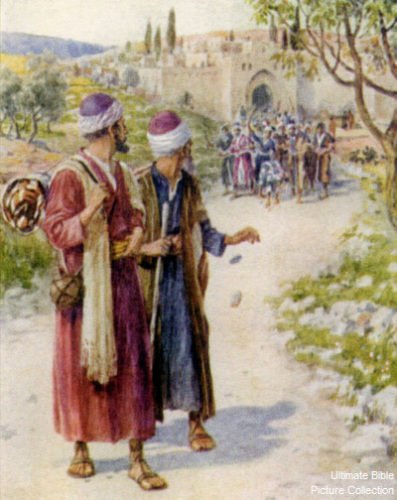
The church in Antioch commissions Paul and Barnabas to take the first major missionary journey.
When I traveled to the Middle East on an interfaith delegation of clergy several years ago, our guide told us something about traveling companions that I have never forgotten.
Aziz said us that you never truly know someone until you travel with them.
Any maybe if you’ve taken any road trips with friends or family this summer you’d agree. For there’s nothing like being trapped in a car (even with headphones) with the same people for hours on end or sharing a one room hotel room to make you feel like you're ready for your own bed again.
I have to think the same was true for Paul and Barnabas. Trapped together in a boat, in side-by-side tents, and walking side-by-side for weeks, they knew one another. They preached together. They taught together. They organized together.
As a preacher/ teacher/ organizer who has also worked throughout my ministry with those who also preach/ teach/ organize, I have to tell you that this kind of work when done together, when done together with the blessing of the Spirit, can be a heart-knitting, a soul-binding season of life like none other. When you do this kind of work with people, you can’t imagine ever-growing a part.
BUT, Acts 15, verse 36 tells us of the conflict brewing below the service of this partnership made in heaven between Paul and Barnabas.
Paul is ready for round 2 telling Barnabas that he wants to “return and visit the believers in every city where we proclaimed the word of the Lord and see how they were doing”
But Paul says no. Barnabas wants to take John Mark. Paul doesn't believe John Mark is a good choice.
The two simply do not see eye to eye.
The great break-up is underway.
Whether it was over personal differences (about John Mark’s readiness for service) as Acts narrates it. Or if it is over theological differences as Paul highlights in his own voice in the letter to the church of Galatians—we aren’t fully sure.
The point is that the two had a “sharp disagreement” a phrase that in the original Greek signifies a passionate or even bitter exchange.
And if you’ve had a sharp disagreement anytime in your life (and I’m sure you have) you know that you just don’t move forward too easily after having one.
Paul and Barnabas were no different. They don’t get back together. Never in scripture do they get back together. 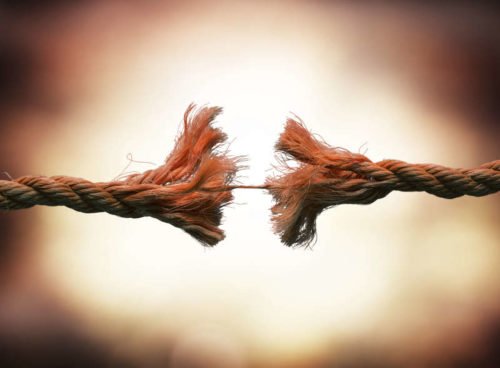
When I first chose to study and preach on this passage this Sunday several weeks ago, I thought about the great mystery of relationships in this crazy world of ours. How someone can walk in our lives as a friend and become a dear one, even a “best” and then one day, say “see ya” with all the complications that follow.
I thought of all of the broken partnerships in our world. Long term dating relationships that end with rivers of tears. Marriages of 5, 10, 15 or 35 years that find their conclusion in the word divorce with blame slung around with never-ending speed. No one gets back together.
I thought of how in the Christian church we so tightly hold on to words like “reconciliation” and “unity” and “peace-making.” But here in this portion of scripture we get none of that. No reconciliation. No unity. No peace.
I believe there’s so much wisdom this text offers us WHEN splits happen in our friendships, our partnerships or even our churches.
For like Paul and Barnabas—when we find ourselves in a “sharp disagreement” with another person, institution or group sometimes the healthiest, most life-giving and fruit-bearing ministry we can do going forward is to SEPARATE from those who do not understand why we do what we do.
But on a morning like this. On a weekend like this. When Charlottesville happened . . . this sermon has to go a different direction than I might have planned to end it.
When hate filled the streets of a city in a state right next door to us . . .
When flags of regimes, we long thought were dead were raised in supremacy of a race killing at least 3 and injuring dozens more . . .
When marchers, many who will fill the pews this morning at churches with the same word “Christian” on the door as is on ours, rallied to say that brown lives and black lives did not matter . . .
When the highest leader in our land did not call out racism for the evil that it is . . .
It seems right to say this morning to have a family meeting. Come close church. It's important to remind one another that there comes a point when we cannot be silent.
For as Christian people, we believe with all our hearts, don’t we that we are ALL God’s children. No matter where we were born. No matter what the color of our skin is. No matter who we choose to love. We are ALL CHILDREN OF GOD. And with this true, there’s no room in our faith tradition, or in this community, or in our country for hate for anyone. There just isn’t.
Those people marching with Nazi t-shirts on aren’t our people.
I know, friends, we don’t like rocking the boat, especially when it comes to our closest friends and family whom we respect and have long-standing relationships with. We don’t like being seen as partisan or even judgmental.
I know friends, we believe in the prayer of Jesus in John 17 when Jesus prayed with all his might that “all of us may be one” . . .
BUT in the spirit of our text this morning (knowing that breaking-up can be one of the most spiritual things we do—even with members of our own tribe), we must break-up from hate.
We must break-up from any voices that don’t call acts like this weekend what they are: sin.
We must not idolize false unity, just for the sake of unity.
We must stand firm—knowing that our calling to strengthen others might just be to strengthen ourselves for the days that lie ahead . . . days when Charlottesville is not just somewhere out there. But here. Right here. In Washington DC. In Hyattsville. In our own backyard.
Elie Wisel, survivor of the Holocaust said this about silence (or another word for what I like to call the refusal to break-up):
“I swore never to be silent whenever human beings endure suffering and humiliation. Silence encourages the tormentor, never the tormented.”
So, what will we do?
Will we be a part of an institutional break-up from hate, from racism, from anything that keeps the message of belovedness away from ANY person?
Will we have that courage to be ok to separate, as now the time that time has for sure come?
Or will we be silent?
I hope not. Pray not this day.
Let us boldly break-up.
A Sermon Preached at Broadneck Baptist Church, Annapolis, MD from Mark 4: 35-41
 This is how our gospel lesson opens: Jesus speaks. It’s an abrupt beginning (as most movement in Mark’s gospel is) where Jesus gives a vague description of what’s up ahead.
This is how our gospel lesson opens: Jesus speaks. It’s an abrupt beginning (as most movement in Mark’s gospel is) where Jesus gives a vague description of what’s up ahead.
And this is what Jesus says to his followers:
“Let’s go across to the other side.”
In these 7 words, we hear no physical description of point A (where they were) or point B (where they were going).
We hear no persuasive speech about the benefits of being on the other side like any parent would do with their grumpy children in tow. “We’re going doctor now, but when we’re done, we’ll get ice cream! Don’t you want ice cream? So you really want to go to the doctor, don’t you?”
We hear no explanation of why the other side is important. It’s set up like one of the stupidest jokes of all times, “Why did the chicken cross the road? . . . To get to the other side!”
But with this simple declarative statement, “Let’s go to the other side” Jesus and his attentive motley crew of 12 disciples and probably some women too find themselves on a boat to reach the unknown.
I can imagine this new journey began with anticipation bubbling over for those in this boat. After all, Jesus recently called them, named them “apostles” and drew crowds of hundreds of people to listen to his teaching. What could be next? It had to be amazing, right?
So why not get on the boat with Jesus? This might be their gateway to the next big thing! And the disciples, I’m sure wanted to be doing the next big thing!
My friend, Krista is one of the most well-traveled people I know. She's always on a journey to the next big thing.
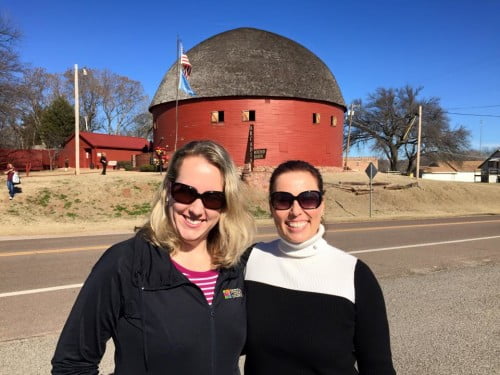 When we catch up for dinner, she always tells me about her next trip planned (even if she just got back from one). You name it; she’ll do it—from scuba diving in the Maldives to spending a day as if she’s a village woman while in Rwanda to swimming with the dolphins in the Cayman Islands. She even came to visit me this year in Oklahoma (see our adventure at the Round Barn on Historic Route 66)! And with trips like this under your belt, I’d say my friend is winning at the adventure card!
When we catch up for dinner, she always tells me about her next trip planned (even if she just got back from one). You name it; she’ll do it—from scuba diving in the Maldives to spending a day as if she’s a village woman while in Rwanda to swimming with the dolphins in the Cayman Islands. She even came to visit me this year in Oklahoma (see our adventure at the Round Barn on Historic Route 66)! And with trips like this under your belt, I’d say my friend is winning at the adventure card!
Recently, Krista spent Christmas holidays with a group of girl friends in Tanzania with the big plan of hiking Mount Kilimanjaro—the highest mountain in Africa and the highest freestanding mountain in the world at over 19,000 feet above sea level.
When Krista told me about the beginning of the hiking trip she began by saying, “Our guide gathered us at midnight.”
I quickly asked “Why? Why would you start such a climb in the middle of the night? Don’t they know that you’d be so tired?”
“I thought the same thing,” she said, “But I went along with the instructions. And later our guide told us this, ‘Because it’s one of the world’s steepest mountains, we needed to start at night. If we began our journey in the daytime we’d see the tough terrain and would not want to take the next step. And furthermore, in the morning, the winds at the base of the mountain are so bad. It would be too scary for us to move an inch.”
And the same would be true of the disciples. If they knew what was coming ahead, they wouldn't begin the journey either!
Because soon after they go in, verse 37 of our text says this, “A great windstorm arose, and the waves beat into the boat.”
I can imagine the disciples' chatter to one another, “This was not what we signed up for!”
But, regardless for their feelings, the windstorm raged on and the waves become higher. The waves got so high that the boat filled with water. They could see the storm. They could hear the storm. They could taste the storm. They could smell the storm too as the water ran over their sandals, and then up their ankles and to their knees.
In the middle of the sea, in the middle of the storm, in the middle of their boat filling up with water, the disciples reached a hard place.
Their journey with Jesus brought them a hard place.
It was a terrible moment when all logic screamed these giant red flags: great suffering up ahead! Pain! Loss! The destruction of dreams! Just prepare yourselves, disciples; this is not going to be pretty this trip in the sea.
But there was no escaping where they were at that very moment. A VERY HARD PLACE.
When I thought about the words hard place this week, my mind couldn’t help but go to that one hard place that is on all our minds this morning. I couldn’t help but speak aloud the place of Charleston, SC.
I couldn’t help but mention the fact that it was at a Wednesday night Bible study only days ago these 9 folks lost their lives simply because they showed up at church—names like Sister Sharonda, Rev. Pinckney, Sister Cynthia, Brother Tywanza, Sister Myra, Sister Ethel, Rev. Daniel, Rev. Depayne, and Sister Susie.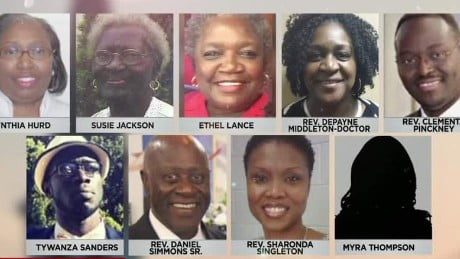
It’s a sin few of us want to talk about few want to name, especially people who look like me.
I couldn’t help but name the heaviness of this hard place for our African-American brothers and sisters especially this morning—those who have put on their Sunday clothes, those who have driven to their congregations, those who have gotten out of their cars and walked up the steps to their sanctuaries afraid.
Afraid for their pastors.
Afraid for their children.
Afraid for themselves.
Afraid that the color of their skin makes them a target for violence done in the name of hate.
It’s a heaviness that we who are white do not and cannot understand.
But yet if we believe we are a part of ONE body who worship ONE Lord, it’s a hard place we must acknowledge and acknowledge some more. When one of us hurts in the Body of Christ, we all do.
And in this, I can’t help but think of how churches like this one define themselves: to be a progressive Christians.
You define yourself according the welcome page on your website as “a community that honors asking questions, serving our neighbors, seeking justice, celebrating diversity, and welcoming all of God’s children. We seek to be a place where all people are embraced for their unique gifts and invited to participate fully in all areas of ministry.”
I can’t help but think about what our shared family of progressive Baptists, the Alliance of Baptists which I am glad to be a part, speaks of as their mission:
“We are Christians knit together by love for one another and God, combining progressive inquiry, contemplative prayer and prophetic action to bring about justice and healing in a changing world.”
And in all of this thinking, I began to wonder then about how our desire to stand up for justice collides with the hard place of this week?
How is God calling us to be in this hard place . . . beyond just putting out a statement condemning hate (as our friends at the Alliance already have done)?
It’s so easy. It’s so very easy to take on the name “progressive.” I would say in this part of the world it’s acceptable label. In some secular circles in DC you’re accepted when you otherwise wouldn't be when you can say you belong to a church that cares about social justice.
But what happens on weeks like this? What happens when the world cries out for justice and for gun violence in churches to not be ok?
Where do we find our progressive mission then? What do we do, church?
And this is a very hard place.
So like those disciples in the boat with Jesus, what will we do with our hard place?
Will we stand with our fellow disciples like those at Emmanuel AME? And, as we stand, will we acknowledge our contributions to this hard place?
Or will we say things like, “It’s a shame.” Or, “What a tragedy!” And leave the work of racial reconciliation to someone else?
As we begin to answer these questions for ourselves, you problem have some concerns.
If you’re like me, with such a problem seemingly “out there” when it comes to the news and Charleston not being our city or our suburb, it’s easy to become swept away feeling overwhelmed. It's not like we can all go to Charleston today and weep alongside this grieving church.
We’re talking about a big problem. Racism is no small thing. It’s a systematic problem embedded in practices and traditions upheld for centuries that if we are white, we've benefited from!
And if you’re like me, you might just want somebody to tell you what to do. “I’d be glad to my part, pastor, if I just knew what to do."
But remember friends, where we found our scripture this morning—in a storm.
Storms are dark. Storms are murky. Storms are such especially in the middle of the sea that you can’t see 10 feet in front of you even if you wanted.
There aren’t always clear answers or clear next steps in storms are there? Where to steer? When to put up the sails? When to stop?
And in the same way, like those first disciples, to reach the other side of this hard place in our country, we, the white church, need to say, “Please help me understand” a lot and "I want to listen" a lot. Knowing that we’ll make mistakes and we never will have the perfect words.
But, we’re following Jesus after all, aren’t we? And like my friend, Krista's journey, we don't get to see what the whole climb up the mountain will be either.
Yet, our job is to actively participate in Jesus’ salvation plan for all people, us included. You and I will be changed on a journey like this—and it’s exactly the point!
And while yes, this whole calling of putting feet to our feet is going to be scary; our fear doesn’t have to immobilize us.
For Jesus comes to us and says like he did to those first disciples, “Why are you so afraid? Do you still have no faith?”
Commentator Bruce Writer says this about being a disciple: "Jesus didn’t expect [the disciples] to stand steely-jawed and silent in the face of the storm. He simply expected them to manage their fear by knowing that he was there, and that he was able, and that he would act." And so we too “Are not called to be fearless. We are called to face our fears by knowing that someone greater than our fears is present, and that Someone cares and can act.”
So though today, we all might find ourselves in the middle of a journey we didn’t sign up for, wouldn’t have started if we saw where it was headed, or even want to see to the other side—this doesn’t change the fact: we’re at a hard place.
It’s the only place we, church, can faithfully be.
The good news is that we're never alone. Because remember- it's Jesus in the boat with us!
So then: what then will the American church do next? What will our progressive family of faith do next? What will the Broadneck Church do next? What will you do next?
We're in a hard place.
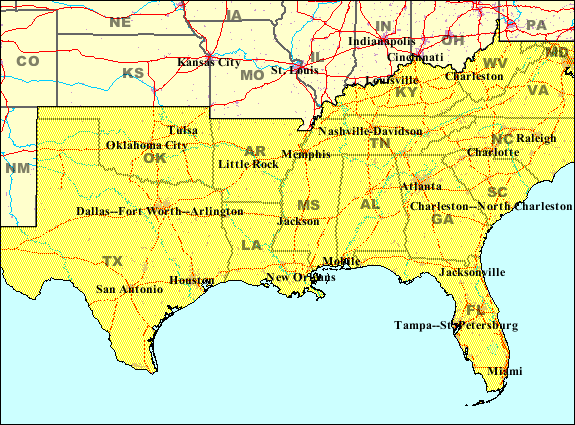 I was raised in the South. I went to college in Alabama. I attended seminary in North Carolina. I learned to eat fried chicken at church potlucks and hymn sings. I was given pearls for my high school graduation. I studied BBQ in its various forms in my Southern History class in college. I learned "cola" as "Coke" for it was the only soft drink that you ever drank. I was as Southern as you come . . . accent included.
I was raised in the South. I went to college in Alabama. I attended seminary in North Carolina. I learned to eat fried chicken at church potlucks and hymn sings. I was given pearls for my high school graduation. I studied BBQ in its various forms in my Southern History class in college. I learned "cola" as "Coke" for it was the only soft drink that you ever drank. I was as Southern as you come . . . accent included.
The pace of life, the readiness of religious opportunities, and the cheap cost of living make the southern part of the United States a wonderful place to grow up and to settle down. I always thought I would attend seminary and return to Alabama to live for the rest of my life.
But, not until I left the South via my first job posting in Maryland (and I know several of you would argue that Maryland is still the South, but for argument sake it isn't Mississippi), did I begin to realize the deep tensions remaining in this part of the country: how broken this region still is over race in more ways than just having "bad sides of town" and "low-income schools." Racial stereotypes are woven in how everyone seems to relate to one another. And, I knew that the life I wanted for myself-- rich in diversity-- would be easier to establish in an area of the country like Washington DC.
How easy I forget, though, how spoiled I have become until I make journeys down south to catch up with friends and family from time to time. Not that the Mid-Atlantic region is perfect, by any means, but it is easier to make friends here of different cultures, races, and traditions as if it is no big deal. Easily I can begin to think that race and nationality are descriptors that just don't apply anymore. Yet, last week, I learned again in Georgia and Tennessee, that our DC life is not the norm.
When folks are described in every day conversation it seems that no one is described without referring to the color of their skin.
When folks of a different color of skin are mentioned, there is a change in facial expression, body language and tone of voice when speaking of this person.
Certain activities are associated with racial groups. I heard it said in the line in at the movie theater by a Caucasian child talking to her Caucasian mother, "I don't want to see that movie. It's a black person film." I heard it said, "That mall is so ghetto. If you drive by that part of town keep your doors locked."
In all of this, I was sobered to think about the world view of my nieces and nephews have and will continue to have are based on unfair biases. Thinking that ALL persons of certain racial groups are somehow less than them because their skin is darker.
The more I thought about it, the more I realized that the real issue in rural southern USA is not race, but what race has meant for the lack of educational and economic opportunities. And, these lack of opportunities continue to oppress.
While interacting with several of Kevin's former high school classmates at his reunion party, I realized that the persons from his class who had been "more successful" in moving away to bigger cities, receiving high education, and maintaining well-paid jobs were Caucasian. I don't think that this is because color of skin has anything to do with intelligence, but because of how environmental factors have diminished opportunities for those with darker skin, Hispanic and African-American alike. And, as a result of these lack of educational and economic opportunities, social tensions were created in an multi-racial gathering of this particular party i.e. the African-American persons had more things in common to talk to one another about not because of their "blackness" but because of their type of jobs, housing and life ambitions.
And so at this particular party, the social dynamics were less about desire to get to know someone who shared different physical features from you (because this didn't seem to be the issue) and more about not having anything to talk about with someone who was from a different racial group. Segregation occurred in more complex ways than first observed.
Do you see how this cycle of racism lives? It overwhelms and frightens me. And, I understand how easily these social patterns of relating to one another will continue and continue for a very long time unless the church both in the South and in other parts of the country, among other social justice groups, seek to address the disparity of this issue right on. Saying, it is not ok to identify your neighbor on the bus, in the grocery store, or who fixes your tv, by their race. It's just not ok, ever. And, it is not ok for my child to go to school with books that are new and your child not to simply because of the part of town in which they live. It's not ok for the church to sit on the sidelines and do nothing to speak of the segregation race still seeks to cause.
Of course it is easier to speak of the disparities of lifestyle by race, saying, "It's what the Mexicans do" or "It's where the black people hang out" or "Our town is so white" but really in the end, it's not about race as much as it about what life has offered us. This fact, I believe needs to be more clearly understood.
I for, one, was glad to be back on my street of diversity a couple of days ago, to be in conversations where the fact that a family is Indian or Asian or whatever doesn't really matter. But, I came back with eyes open to new prayers I have for the great human family and the children who grow up not being taught by their parents, teachers and pastors any better. Praying as Jesus did on the night before his death: "Holy Father, protect them by the power of your name-- so that they may be one as I am one with you."